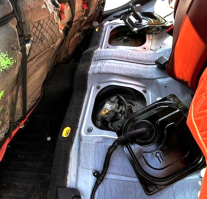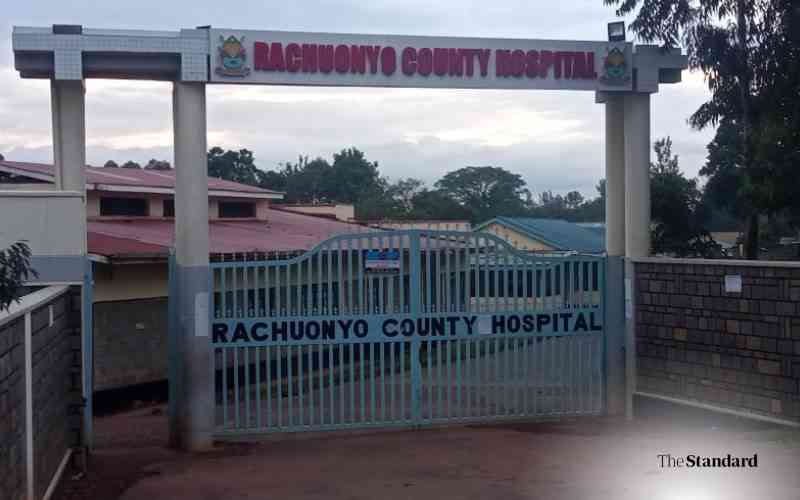Hyundai Argues Swelling Gas Tank Lawsuit is Empty

— A Hyundai and Kia class action lawsuit alleges the gas tanks swell and expand in 2021-2024 Kia K5 and 2020-2024 Hyundai Sonata cars.
The swelling fuel tanks are allegedly caused by defective engine control modules and faulty evaporative emissions control systems. Specifically, the purge control solenoid valves.
The Kia K5 and Hyundai Sonata vehicles are equipped with Gamma II T-GDI 1.6-liter engines.
Kia created a free Kia K5 "voluntary emissions service campaign" in April 2024 because of problems with the purge control solenoid valves. A swelled and expanded fuel tank can allegedly cause the back seat to dislodge and the frame can bend, a problem the plaintiffs claim is impossible to repair.
According to the Hyundai purge control solenoid valve class action, Hyundai and Kia “knew, or should have known,” of the problems with swelling gas tanks but the automakers concealed everything from consumers.
"This bulletin provides information to inspect the fuel evaporative system and, if necessary, replace the fuel tank and/or the Purge Control Solenoid Valve (PCSV) check valve on certain 2021-2024MY K5 (DL3a) vehicles equipped with a Gamma II 1.6L T-GDI engine, produced from March 27, 2020 through October 17, 2023. This bulletin also provides information to upgrade the ECU software logic. The subject vehicles may experience fuel tank swelling due to an issue with the PCSV check valve, which results in pressurized air to flow into the fuel tank. This may cause the Check Engine Light to illuminate, and in some cases, the engine to run rough, and/or an inability to refuel." — TSB SC288
The plaintiffs claim because their vehicles are allegedly defective hundreds of thousands of vehicles are defective in the U.S.
Hyundai filed a motion to dismiss the expanded gas tank lawsuit and argues the allegations don't hold up.
The Hyundai purge control solenoid valve lawsuit was filed by California plaintiff Timothy Masters, Texas plaintiff Lisa Garcia, and Illinois plaintiff Michelle Frank-Crowder. The plaintiffs contend they had problems adding fuel to the vehicles and the fuel tanks expanded.
In its motion to dismiss, Hyundai asserts plaintiffs Masters and Frank-Crowder received free repairs under warranty, and plaintiff Garcia refused repairs from her Hyundai dealer under warranty and chose instead to pay for repairs from a Midas service facility. Yet the plaintiffs paid $405 to file the Hyundai class action for more than $5 million.
According to the expanded fuel tank lawsuit:
"Hundreds of thousands of Hyundai and Kia vehicles are 'defective in that they are designed and manufactured, assembled and/or installed . . . in a manner that prevents the gas vapors' from properly venting and allow vapors to instead “build up in the fuel tank and other areas of the fuel system,' allegedly leading to engine performance issues, fuel odors, difficult fueling, and 'expansion of or distortion of the shape of the fuel tank.'”
The lawsuit was filed as a nationwide class action, but Hyundai and Kia argue the plaintiffs lack standing to bring nationwide fraud and unjust enrichment claims.
According to Hyundai, courts within the Ninth Circuit allegedly have “overwhelmingly ruled that plaintiffs ‘do not have standing to assert claims from states in which they [neither] reside [nor suffered an injury]’ and that it is ‘appropriate to address standing in advance of class certification.’”
The three vehicle owners who sued are from California, Illinois and Texas. But Hyundai argues they cannot plausibly allege they sustained injuries in states where they did not purchase a vehicle and "cannot establish Article III standing to assert 'nationwide' claims arising under the laws of all 50 states."
Hyundai and Kia also say warranty claims must be dismissed because the plaintiffs were not denied or refused repairs under the warranties. Hyundai argues plaintiff Masters concedes his vehicle was repaired twice under warranty and free of charge. And he allegedly does not complain of any fuel system problems following the September 2024 repair.
"There is no breach of warranty claim when a vehicle is repaired under the warranty—that is performance, not breach." — Hyundai and Kia
Hyundai turns to plaintiff Frank-Crowder who "likewise received free warranty repairs."
"First, she received an ECM update pursuant to KA’s voluntary emissions campaign on May 9, 2024, and then she received a replacement high-pressure fuel pump and gasket on June 24, 2024. And while Plaintiff Frank-Crowder now alleges that 'she has not received a permanent repair under warranty' and that 'her vehicle continues to exhibit the Fuel System Defect,' she pleads no facts in support."
Kia also argues the plaintiff doesn't claim she brought her vehicle to a dealer to fix any ongoing problems. Instead, the plaintiff complains any dealer repairs would be "futile."
Kia contends her "bare speculation" is not legally good enough to plausibly show Kia failed to repair her vehicle or refused to perform warranty repairs.
Kia then turns to plaintiff Garcia’s breach of warranty claim which the automaker says is fatally flawed. Garcia complains she took her vehicle to a Hyundai dealership in June 2024 after having problems with the gas tank. But Kia asserts the plaintiff admits she refused a free repair because she didn't want to wait.
Instead, she took her vehicle to a Midas repair shop and paid $1,600 of her own money for repairs. Hyundai says its warranty is clear when it says, “[w]arranty service will be provided by an authorized Hyundai Dealership . . . .”
The swelled fuel tank lawsuit alleges the vehicle warranties are “unconscionable” because Hyundai and Kia created the warranties without first discussing things with owners. According to the lawsuit, the owners who sued “had no bargaining power” and “had to accept [the warranties] in the exact form they were presented."
In other words, the plaintiffs complain Hyundai and Kia should have included the opinions of the plaintiffs when the warranty terms were written.
Hyundai argues this is nonsense and something courts routinely reject. Hyundai argues if the plaintiffs didn't like the warranties, they could have purchased vehicles elsewhere that better matched what the plaintiffs wanted.
“If the plaintiffs wanted additional coverage beyond the ‘shorter period’ of the warranty, they had the option to purchase an extended warranty; this provided the meaningful choice that is unavailable in a procedurally unconscionable contracts.” — Hyundai and Kia
There are also the statutes of limitations which apply to some of the vehicles. The class action lawsuit includes 2020-2024 Hyundai Sonata and 2021-2024 Kia K5 vehicles. Yet the statute of limitations for many of the claims is only two or three years and expired years ago for many of these vehicle owners.
Finally, Hyundai contends the class action lawsuit shouldn't even be in court because the plaintiffs signed binding arbitration agreements when they purchased their vehicles. Hyundai and Kia separately filed motions to compel arbitration and to pause this lawsuit until an arbitrator steps in to hear the arguments.
The Hyundai and Kia swelling gas tank lawsuit was filed in the U.S. District Court for the Eastern District of California: Masters, et al., v. Hyundai Motor America, Inc., et al.
The plaintiffs are represented by Capstone Law APC, Berger Montague PC, Milberg Coleman Bryson Phillips Grossman, and Jeeves Mandel Law Group PC.













